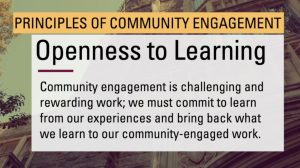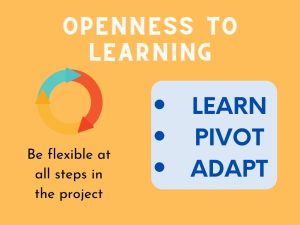Chapter 11: Openness to Learning

McMaster’s principle of openness to learning is a key foundation in our relationships with community partners. McMaster describes this principle with a statement of commitment:
Learning as part of any community partnership means actively and openly listening to one another. It is critical that students meet community partners as equals in a reciprocal relationship of engagement and learning. Remember that community partners are experts in their fields possessing years of lived experiences.
Learning as part of any community partnership means actively and openly listening to one another.Students must practice humility, listen carefully and be responsive. At the same time, students must recognize that they are bringing valuable insight, knowledge and energy to community partners that itself deserves respect and engagement.
Doing so is a precursor to accepting that we are all learners and have room to grow. Only then can a community-engaged relationship be successful.

We can be defensive or anxious about our position when we go into the community. This is only human. Sometimes this can lead to inflexible or stubborn behaviour rather than allowing us to be open to the learning that can occur. Be willing to reconsider your thoughts and assumptions while being open to growing and changing your perspectives in your work with and in the community.
Be willing to reconsider your thoughts and assumptions, while being open to growing and changing your perspectives in your work with and in the community.For example, if you are working in a Reading Buddies program with young students in an elementary school classroom, then you may have expertise and experience to share as you guide the students in their reading. At the same time, the young students have their own experiences to share with you. These experiences may alter how you engage them in their reading or may inform your activities, your tone of voice and even your goals for the placement. Moreover, the teachers and other staff at the elementary school will be knowledgeable about child development, literacy benchmarks and milestones, and individual student learning plans. All of this information can help you be more responsive and responsible when working with the students. And, finally, your peers and your instructor will have advice and guidance for you as well.
Rachael and Elizabeth discuss their respective experiences with Openness to Learning in the MacChangers program and Research Shop in this short video clip (access to closed captions in toolbar):
Watch the whole 27-minute video, “The Principles of Community Engagement Module” [27:38].
Case Scenario: Openness to Learning
You are working in a small group to put together a proposal for how to improve access to a Needle Exchange Centre in downtown Hamilton. One of your group members suggests adding large planters on the sidewalk in front of the small storefront as a way “to brighten things up.” The Community Partners had not mentioned anything about plants or decor when they spoke to the class, emphasizing instead negative public perceptions of the program, law enforcement concerns and access to supplies.
- How and why do you incorporate or reject your group member’s suggestions?
- Consider also how you might enhance your group member’s learning journey and encourage them to demonstrate openness to learning.
Checklist: Openness to Learning
Here are some questions you might ask yourself when considering the principle of openness to learning in your community engaged learning experience:
- Are there elements of my lived experience that might make working and learning with this community partner difficult? What are they?
- What difficulties might I have when learning from and with individuals who are dissimilar to me?
- How have I demonstrated that I am listening to my community partner? What steps have I taken to ensure there is clear and honest communication with my community partner?
- How do I approach learning and growing from mistakes and misunderstandings?

